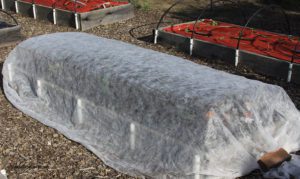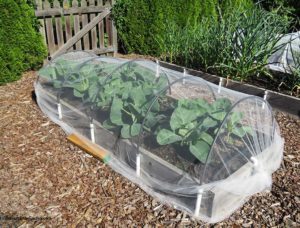March 11 Column: Organic Gardening

In today’s garden column, I talk about organic gardening. This is something that is very easy to do by using good cultural practices. Here is a link to it in The Spokesman-Review. Investigate different ways to control pests. (or you can read my column lower in this post)
By the way, I hope you’re not getting tired of hearing about floating row cover! It’s a great tool for season extension or a physical barrier. When used as a barrier, it keeps certain damaging insects away from the more susceptible crops I grow.
How I use row covers in organic gardening
I only need to use it for the following crops. Beet family crops (beets, spinach and Swiss chard). The goal is to keep the leaf miner adults from laying eggs on the plants’ leaves. Cabbage family crops (broccoli, cabbage, cauliflower, kale, kohlrabi, etc.) It keeps aphids from getting on the plants and cabbage butterflies from laying eggs on the leaves. Those are really the only troublesome insects I deal with in my garden. Note that NONE of these crops require pollination so they can be covered for the entire season.
Tulle fabric for row covers
An alternative cover I use over cabbage family crops is tulle. It’s more commonly known as bridal veil netting (see photo at left). You can find it at fabric stores and it comes in wide widths. I’ve found the tight mesh keeps insects away from those crops. And there are 2 benefits to its more “open” mesh. It provides more air circulation for these cool-season crops as well. It also allows me to better see what’s going on in that bed. I’ll easily know if there’s a slug problem starting up or something else along those lines. I heartily recommend it, and am so glad my friend Jane mentioned it to me several years ago!
Also, remember that I created an Organic Pest Control guide on this website, under the Guides menu. That has a lot of information on dealing with pests without resorting to the use of chemicals.
This week’s video is also about organic gardening. My goal was to further clarify how easy it is to garden without chemicals:
In my video, I referred to my “weed strategies” video from last summer. It’s packed with ideas for preventing and dealing with those pesky weeds. Here it is:
If you’re curious about the colorful plants in the photo at the very top, those are ‘Bright Lights’ Swiss chard. They are so pretty and so tasty. They definitely need to be covered with floating row cover during the whole season. That’s to keep those pesky leaf miners away.
I hope you are enjoying the columns and videos so far. I have a lot of useful topics planned for the entire season!
Garden column: Organic Gardening
by Susan Mulvihill
Do you ever feel like the insect world is out to get your garden? It can sometimes seem that way. There are many strategies you can employ to grow a healthy, productive garden without chemicals.
Even though it’s easy to reach for a can of bug spray, consider a few things first.
Why is organic gardening important?
Pesticides are non-selective, meaning they can kill both the targeted insect and others nearby. They adversely affect pollinators, especially if used around flowering plants.
Pesticides are harmful to us. I don’t know about you, but I don’t want to handle them, breathe them or be exposed to them. And when it comes to growing my own vegetables and fruits, I want to know they are safe to eat.
In general, chemicals throw off the balance in our gardens. If you kill one type of insect, what will their natural predators eat?
Simple organic tips:
The most important thing you can do is monitor your garden on a regular basis. This will help you spot a potential problem in an early stage when you can easily address it. I’ve often found that beneficial insects will take care of a problem before I need to act on it.
When you see insects, determine if they are beneficial, benign or damaging. If you aren’t able to identify them, ask your local Master Gardeners to help you with this. There is no cost for this service.
Most songbirds eat insects so make them welcome in your garden. How? Provide trees and shrubs that they can hide in, along with a water source for drinking and bathing.
Consider hand-picking the damaging insects off your plants. Or remove the leaf or branch they are on and dispose of it. Aphids can be blasted off of plants with a strong jet of water.
Row cover uses:
In last week’s column, I mentioned the use of floating row cover. For one thing, it can extend the garden season. It also acts as a physical barrier that keeps troublesome insects away from your plants. The row cover can only be used for crops that don’t need to be pollinated. This includes cabbage family crops, beets, spinach and Swiss chard. For those crops, I keep them covered for the entire season. That way, I avoid problems with aphids, cabbage worms and leaf miners. I don’t need to cover any other types of plants.
I created an organic pest control guide on my website. My goal is to help gardeners find safe ways to address insect problems on edible crops. You can find it at susansinthegarden.com/guides/organic-pest-control.
More organic gardening practices
What other organic practices can you engage in? Avoid adding synthetic fertilizers to your soil. Our gardens can be more fertile by just placing a thin layer of organic compost to the soil surface annually. It doesn’t need to be rototilled in, which can damage the structure of the soil where beneficial microorganisms reside.
If your plants really seem to be struggling, consider having a soil test done. That way, you’ll know if it’s lacking certain nutrients. The Spokane County Conservation District (sccd.org) conducts these tests. Always use organic amendments to address a deficiency.
If weeds have been a problem in the past, avoid weed killers and synthetic pre-emergent chemicals. Instead, mulch around your plants thickly to make it difficult for weeds to grow. The less you disturb your soil, the fewer weed seeds you’ll bring to the surface. That will make gardening much more enjoyable.


